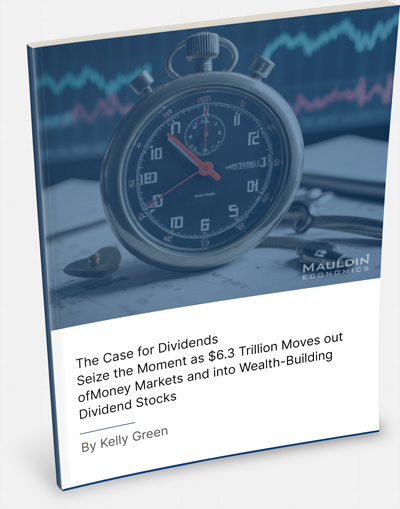
“Alphabet Soup” Stocks to Supercharge Your Income in 2024
-
 Kelly Green
Kelly Green
- |
- January 10, 2024
- |
- Comments
The investing world uses a lot of abbreviations and acronyms. We describe the financial status of companies using EPS, P/E, P/S, and a slew of other measures. Even ticker symbols are just shorthand for the company name.
My three favorite acronyms are used to classify certain passthrough investments—REITs, MLPs, and BDCs. They trade just like regular stocks but are very different. These companies do not have to pay taxes. Instead, they are required to pass through at least 90% of their income to unitholders (shareholders) who then pay the taxes.
This special structure avoids double taxation, and unitholders get to collect above-average yields. They are perfect for building long-term wealth or boosting your stream of income.
I fondly call these companies my “alphabet soup stocks.” And despite having different tax treatments, I always have a handful of them in my portfolio.
When asked about my game plan for 2024, owning REITs, MLPs, and BDCs will be front and center for above-average yields. They will be the topic of my presentation at the 2024 Portfolio Playbook MoneyShow Virtual Expo next week. This is a free three-day event from January 16‒18. I’ll be sharing my presentation titled “The Stampede into Dividend Stocks Starts Now” on Wednesday morning. You can register and claim your ticket here.
For now, I want to share a quick overview of these uniquely important companies with my loyal Digest readers.
- REITs Help Individual Investors Access Real Estate
Real Estate Investment Trusts (REITs) were created in 1960 as part of the Cigar Excise Tax Extension. They were created to give all investors the opportunity to invest in high-quality commercial real estate. Prior to this, real estate income was only accessible to deep-pocketed investors. On the other hand, REITs are required to have at least 100 unitholders.
To qualify as a REIT, a company must invest at least 75% of its total assets in real estate. This can include owning physical real estate and collecting rents, profits from selling physical properties, or collecting interest on property mortgages. There are over 1,000 REITs in the US, and over 225 trade of one of the major US exchanges. Collectively, they own more than 575,000 properties valued at over $4 trillion.
You can find REITs that operate in almost every category of real estate, including commercial space, office space, and residential. Some focus on properties with specific uses, such as cannabis or leisure and gaming. You can even invest in collections of mortgages through mREITs which purchase or provide mortgages or mortgage-backed securities.
- MLPs Are My Favorite Way to Invest in the Oil Industry
In 1987, Congress first defined the rules for Master Limited Partnerships (MLPs). These passthrough entities must derive their revenue from dividends, rents, interest, capital gains, or the transport and/or storage of natural resources. The number of MLPs slowly climbed in the ‘80s and ‘90s and became very popular in the 2000s. There are over 130 MLPs trading on major US exchanges.
MLPs are my favorite way to hold oil exposure in my portfolio. That’s because regardless of the price of oil, it needs to be transported through pipelines. You will see MLPs commonly referred to as the middleman or the toll collector of the oil and gas industry. And they are usually minimally affected by the rise and fall of resource prices because they operate using long-term, fixed-price contracts.
I’ve mentioned many times that Enterprise Products Partners (EPD) is one of my favorite MLPs. I’ve recommended it for over a decade and it’s still paying out over 7%. I personally plan on holding this stock forever.
- BDCs Are a Great Way to Invest in Private Companies That Are Otherwise Off Limits to Investors
Business Development Companies (BDCs) are companies that make investments in smaller or developing companies, or companies in financial distress. They were created in 1980 by Congress to assist emerging US companies in raising funds. In turn, this would fuel job growth and boost the economy.
To qualify as a BDC, a company must invest at least 70% of its assets in private or public US firms with a market value of less than $250 million. And BDCs cannot just throw money at companies. They must also provide managerial assistance to these companies.
BDCs give us access to private companies that would otherwise be off limits to most investors.
Like what you're reading?
Get this free newsletter in your inbox every Wednesday! Read our privacy policy here.
For more income, now and in the future,

Kelly Green

 Kelly Green
Kelly Green
